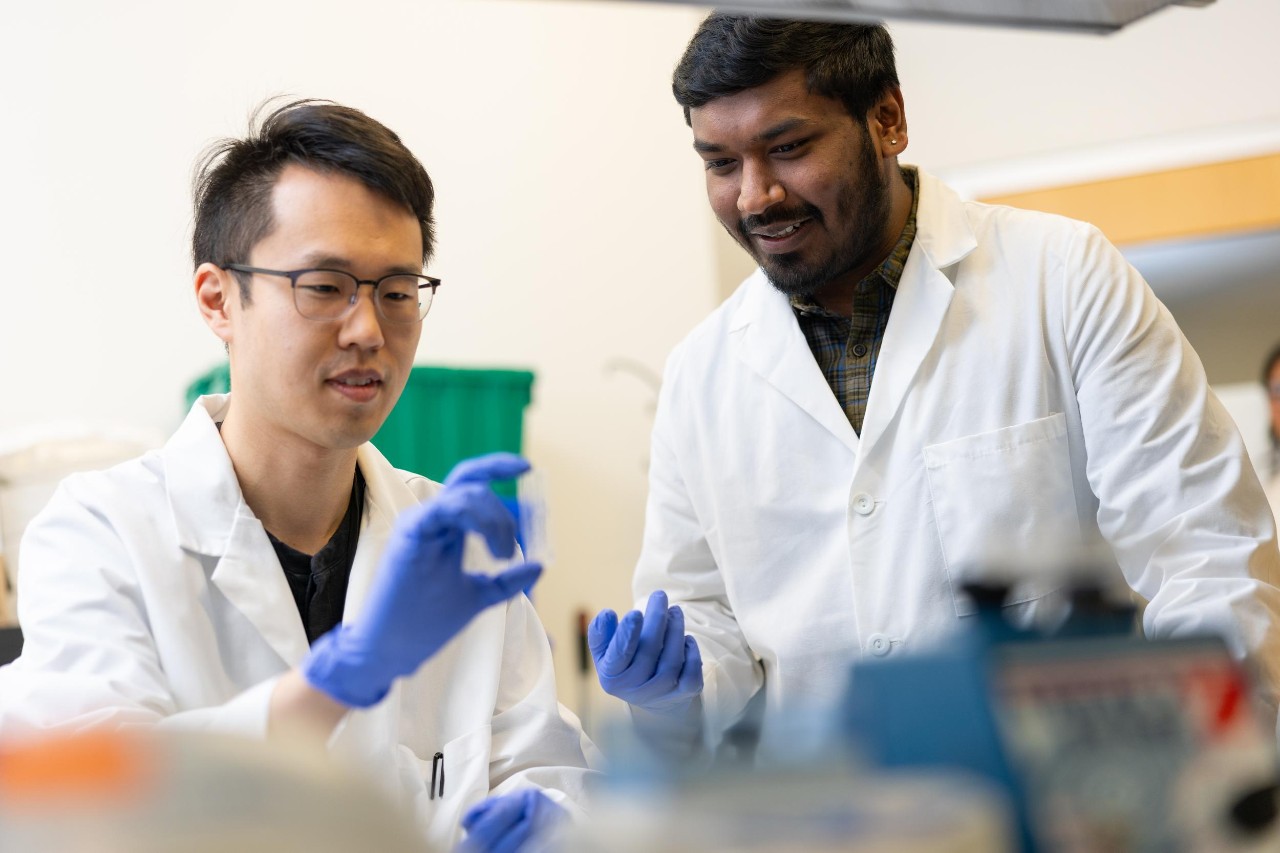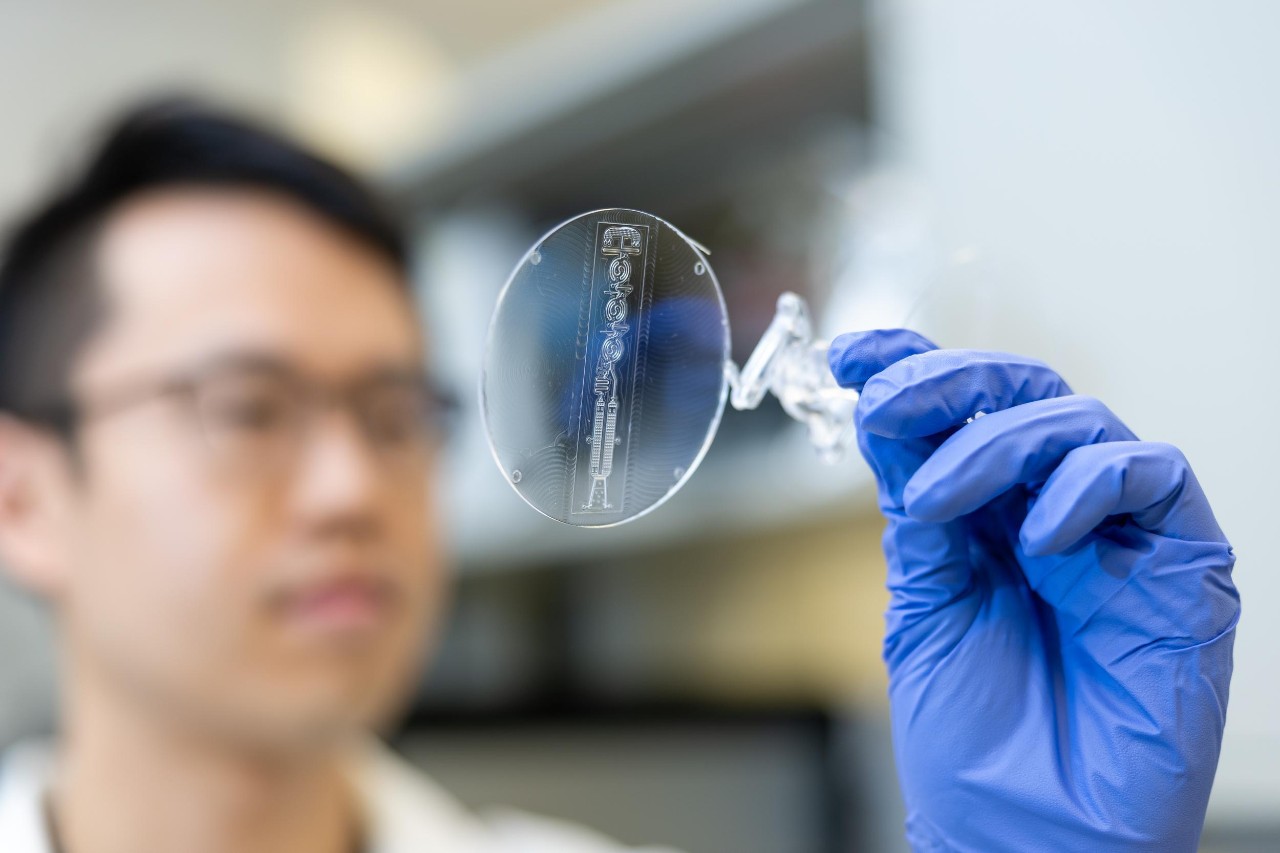
UC lab-on-a-chip devices take public health into home
Engineering lab designs home tests for stress, cardiac issues
University of Cincinnati engineers created a new device to help doctors diagnose depression and anxiety.
UC College of Engineering and Applied Science Distinguished Research Professor Chong Ahn and his students developed a “lab-on-a-chip” device that measures the stress hormone cortisol from a patient’s saliva. Knowing if a patient has elevated stress hormones can provide useful diagnostic information even if patients do not report feelings of anxiety, stress or depression in a standard mental health questionnaire.
Mental health disorders affect more than 400 million people around the world. Stress disorders such as anxiety and depression are among the leading causes of disability worldwide. Prolonged cortisol elevation is linked to numerous mental health disorders, including depression and anxiety.
UC researchers created a lab-on-a-chip system to track a patient’s cortisol levels. It consists of a disposable collection device that a person puts in their mouth which is then inserted into a reader. The reader can transmit results in minutes to a portable analyzer and smartphone.
The study was published in the journal Biomedical Microdevices.

UC College of Engineering and Applied Science Distinguished Research Professor Chong Ahn is working on new applications for point-of-care testing. It consists of a cartridge that measures cortisol in a sample of saliva and transmits the results to a phone or computer. Photo/Andrew Higley/UC Marketing + Brand
“We’re working on point-of-care testing, which allows patients to do testing at home or in a clinic. People don’t want to go to a lab to get invasive tests,” Ahn said.
“Mental health care can be an urgent situation. And so these tests will help doctors make timely interventions,” Ahn said.
“The system uses traditional psychometric evaluations in a questionnaire along with physiological biomarker measurements that provide evidence-based diagnostics,” he said. “This approach has the potential to open a new realm of diagnostics for stress disorders.”
Patients can do the testing themselves and share results with doctors via smartphones, he said.
Point-of-care testing is a practical way to make results available quickly for everyone.
Supreeth Setty, UC doctoral student

UC doctoral students Heeyong Jang, left, and Supreeth Setty are working on new point-of-care tests for heart disease, depression and other health issues. Photo/Andrew Higley/UC Marketing + Brand
Early warnings
Study co-author UC doctoral student Supreeth Setty is working on a related project for his dissertation that examines another hormone (dehydroepiandrosterone) that goes by the acronym DHEA. That hormone helps to counteract the effects of too much cortisol in the body. Research has shown that high ratios of cortisol to DHEA are indicators of chronic stress associated with conditions such as depression and anxiety.

Chong Ahn is a distinguished research professor in UC's College of Engineering and Applied Science. Photo/Andrew Higley/UC Marketing + Brand
“When a patient comes in, they take blood samples. Normally it takes days to get lab results back,” Setty said. “But here the results are obtained in a few minutes using saliva, and it’s noninvasive.”
Setty said the tests provide clinicians with objective evidence to supplement traditional screenings such as the patient health questionnaire.
“Point-of-care testing is a practical way to make results available quickly for everyone,” he said.
Unlike mental health questionnaires that can be more subjective because they rely on a patient’s candor and self-awareness, the cortisol and DHEA tests are objective and can raise a red flag about a patient’s levels of stress, Setty said.
“The next step would be to collaborate with psychiatrists and conduct clinical trials to see if our platform works as expected,” Setty said.
UC doctoral graduate Vinitha Thiyagarajan Upaassana was the lead author of the study. UC's Setty and doctoral student Heeyeong Jang also co-authored the paper. The project was partially funded by UC’s Technology Accelerator Project.

UC doctoral student Heeyong Jang and his co-authors developed new applications for point-of-care testing in Professor Chong Ahn's engineering lab. Photo/Andrew Higley/UC Marketing + Brand
Other applications
UC researchers say their technique can be used to diagnose other health issues.
In particular, they examined troponin, a protein that gets released into the bloodstream when patients suffer damage to their hearts from conditions such as a heart attack. The amount of the protein released depends on how much damage the heart sustains. High cardiac troponin levels in combination with symptoms such as chest pain can indicate a heart attack in progress.
In a paper published in the journal Analytical Chemistry, Jang, Setty and Ahn unveiled an innovative new device for a rapid and effective point-of-care biochemical test that measures troponin from a drop of blood.
“Once you survive a heart attack there is an increased probability of having another heart attack,” Jang said. “If you feel a little weird, it’s better to go directly to the hospital. But we can monitor troponin in the blood on a daily basis and hopefully get valuable information. The test provides immediate results, which is important when a patient is in need of immediate care.”
“A new home test kit to screen or monitor the elevation of cardiac biomarkers such as troponin is very desirable,” Ahn said.
The home health care industry is a staggering $400 billion per year, according to the analyst Grand View Research. More people became familiar with self-diagnostics during COVID-19 when government agencies dispensed millions of at-home tests.
Jang said these simple tests could help patients get quicker diagnoses leading to more effective treatments.
UC researchers also developed a new point-of-care-testing platform for COVID-19. Researchers unveiled their new design in the journal Sensors and Diagnostics.
Featured image at top: UC College of Engineering and Applied Science Professor Chong Ahn is developing new applications for point-of-care-testing in cardiac care and mental health. Photo/Andrew Higley/UC Marketing + Brand

UC Distinguished Research Professor Chong Ahn, far right, talks to doctoral students Heeyong Jang and Supreeth Setty and graduate student Varsha Lingam in his lab. Lingam is working on software for smartphone apps that Ahn and his doctoral students are developing. “I’m interested in solving problems with technology,” she said. Photo/Andrew Higley/UC Marketing + Brand
Innovation Lives Here
The University of Cincinnati is leading public urban universities into a new era of innovation and impact. Our faculty, staff and students are saving lives, changing outcomes and bending the future in our city's direction. Next Lives Here.
Related Stories
Fentanyl overdoses hitting the elderly
February 23, 2026
The University of Cincinnati's Daniel Arendt was featured in a Jacksonville news station News4Jax report on the increase in fentanyl overdose deaths in seniors.
UC/UC Health Addiction Center to advance addiction research, treatment and education
February 23, 2026
The University of Cincinnati and UC Health have launched the UC/UC Health Addiction Center, a multidisciplinary initiative designed to unite research with clinical and educational expertise to improve addiction prevention and treatment outcomes in the Greater Cincinnati community and beyond.
Engineering professor gives students chance to explore physics with dance
February 23, 2026
University of Cincinnati students and high school students can explore physics concepts through dance during a weeklong summer experience at UC. Students from all backgrounds who are accepted into the program will spend a week working with both researchers and dancers at the Physics + Dance Lab, a summer day camp on August 3-7, 2026. Sarah Watzman, UC associate professor of mechanical engineering, is partnering with Black Box Dance Theatre for an educational component of her recent NSF CAREER Grant.
